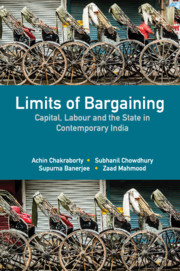Book contents
- Frontmatter
- Contents
- List of Tables
- List of Figures
- Preface
- 1 Contextualising Trade Unions and Collective Bargaining
- 2 Collective Bargaining in India: An Overview
- 3 Everyday Processes of Collective Bargaining in West Bengal
- 4 Industrial Stagnation due to ‘Labour Militancy’? A Critical Look at the Macro Evidence
- 5 Trade Unions and Working-Class Politics in Contemporary West Bengal
- 6 The State and Collective Bargaining
- 7 Conclusion
- References
- Index
2 - Collective Bargaining in India: An Overview
Published online by Cambridge University Press: 05 June 2019
- Frontmatter
- Contents
- List of Tables
- List of Figures
- Preface
- 1 Contextualising Trade Unions and Collective Bargaining
- 2 Collective Bargaining in India: An Overview
- 3 Everyday Processes of Collective Bargaining in West Bengal
- 4 Industrial Stagnation due to ‘Labour Militancy’? A Critical Look at the Macro Evidence
- 5 Trade Unions and Working-Class Politics in Contemporary West Bengal
- 6 The State and Collective Bargaining
- 7 Conclusion
- References
- Index
Summary
As a mechanism or institution of negotiation of the terms and conditions of employment, collective bargaining is dynamic. The subject matter of collective bargaining is contingent on changes in macroeconomic conditions and political developments. Intuitively the meaning and subjects of collective bargaining have been subject to alterations in the context of liberalisation. A survey of the literature on collective bargaining in India reveals two broad and contradictory strands of argument. On the one hand, traditional collective bargaining as a mechanism of negotiation between employers and employees has increasingly come under attack. Conceived as an institution to cover all negotiations between employers and employees to determine working conditions and terms of employment, it is argued to be a vestige of the older industrial production system, inefficient and to some extent redundant in the new economy (Vijay Durga Prasad 2009). On the other hand, the revival of collective bargaining has been one of the key issues of labour market reforms along with the relaxation of regulatory rigidity. Collective bargaining has been considered the desired mechanism of industrial negotiation that was hitherto marginalised due to political factors. In fact, collective bargaining has been hailed for its service to Indian industries by introducing changes in labour relations and allowing for restructuring in both public and private sectors in response to the changed economic situation (Venkata Ratnam 2003).
The debate over collective bargaining in India is in conformity with the observations of scholars in the global context. One strand of contemporary literature suggests that transformations of work and employment present major challenges to traditional workplace collective bargaining models that developed in an earlier industrial era based on full-time employees in long-term employment relationships. Organising strategies within this model were premised on large, centralised workplaces, regular shift changes and a large, stable, homogeneous workforce (Herod 2007). In the new economy, however, there has been a reorientation of the productive, reproductive and institutional structures reflected through developments such as deregulation, deindustrialisation, rise of services, use of ICTs to reorganise business, new forms of ‘flexible’ work and employment, and offshoring (Martin 2007; Perrons et al. 2006). As a consequence, traditional life-term employment is replaced by flexible employment, as work processes have been fragmented through complex subcontracting leading to spatial dispersal of workers across multiple work sites, and high levels of job mobility (Benner 2003).
- Type
- Chapter
- Information
- Limits of BargainingCapital, Labour and the State in Contemporary India, pp. 14 - 25Publisher: Cambridge University PressPrint publication year: 2019

